Companies right here in Lawrence create innovative technology for the health-care industry to save lives all across the globe.
| 2019 Q4 | story by Tara Trenary | photos by Steven Hertzog
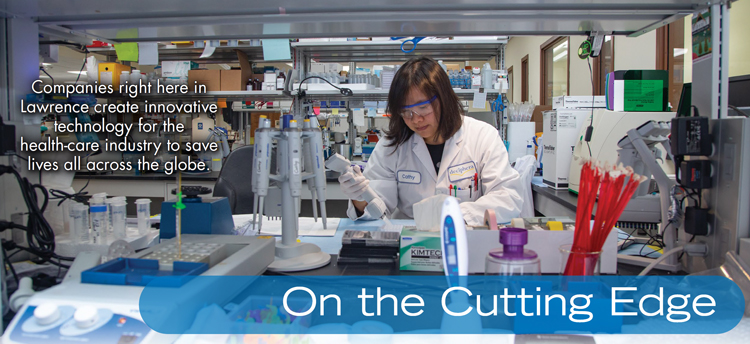
Cathy Zhan, Ph.D., Senior Scientist I, Biological Sciences pipetting reagents into a screening assay.
Technology plays a crucial role in many industries, but health care is one of the most important. Technological advances in medicine in areas such as biotechnology, information technology, pharmaceuticals and the development of medical devices and equipment have helped physicians better diagnose and treat patients, saving lives, sustaining health, curing illnesses and improving overall quality of life for people all across the globe.
According to top doctors and researchers at the Cleveland Clinic, a nonprofit multispecialty academic medical center that integrates clinical and hospital care with research and education, the Top 10 Medical Innovations for 2019 include: alternative therapy for pain, the advent of AI in health care, expanded window for acute stroke intervention, advances in immunotherapy for cancer treatment, patient-specific products achieved with 3-D printing, virtual and mixed reality for medical education, visor for prehospital stroke diagnosis, innovation in robotic surgery, mitral and tricuspid valve percutaneous replacement and repair and RNA-based therapies.
“As a clinician and researcher, I’m excited about the potential to use technology to paint a more comprehensive picture of health—much of which happens outside the four walls of the clinic,” says Jessica Mega, MD, MPH, chief medical and scientific officer at Verily, a research organization focused on using technology to better understand health, in a Sept. 2019 Web MD article on health-care innovations. “Using advanced sensors or mobile technology, for example, we can more richly capture information across day-to-day life and empower patients, doctors and care teams to more proactively address health.”
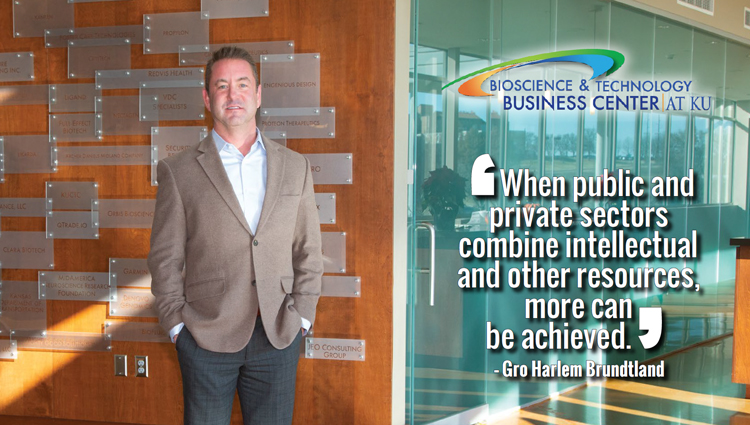
GR Underwood, President of the Bioscience and Technology Business Center.
Local Connection
These innovations are not just being developed at The Mayo Clinic, Cedars Sinai, Johns Hopkins and other predominant research facilities, but also right here in Kansas. “Lawrence has all the makings of a tech hot spot,” explains GR Underwood, president of the Bioscience and Technology Business Center (BTBC) at the University of Kansas (KU). The BTBC is an equal partnership among the City of Lawrence, Douglas County, The University of Kansas and the Lawrence Chamber of Commerce to support the bioscience and technology industries in northeastern Kansas. These entities initially came together and pooled their resources for the purposes of high-tech and life-sciences economic development, specifically to leverage all the resources at KU.
The BTBC acts as an incubator facility on KU’s West Campus that houses such health-care tech companies as HylaPharm, Ligand, BioFluidica, Sunflower Genomics, Crititech, ViroVax, Clara Biotech, Oak Therapeutics, BrightEHR and KanPro, all of which are on the cutting edge of innovation in health care. (The Center also houses other types of startup and spinoff businesses, as well as large, private-industry satellite offices that seek proximity to KU.) Along with housing the businesses, the BTBC also offers business planning, revenue and financial modeling, marketing analysis, competitive landscape assessment and help with raising capital, among several other support services. “We’re not just an office and lab building. We wrap them with any support mechanisms we can that will accelerate their growth,” Underwood says. The Center “creates, recruits, grows and retains high-tech and life-sciences companies into northeast Kansas and specifically Lawrence.”
Many of the companies associated with the BTBC were started by KU researchers, while others are here simply to be near the university. “KU is a major research institution,” Underwood explains. “The goal is to get it [research]out into the community for the greater good.”
Talent is another driver, Underwood continues. Companies are always looking for good people. And high-tech and life-sciences companies tend to grow and scale rapidly. “They pay more than your average job, and that’s what we care about. We want to create high-paying jobs that create wealth in the local community.”
For that reason, the BTBC has plans to expand into a research and business park on KU’s West Campus in the near future.
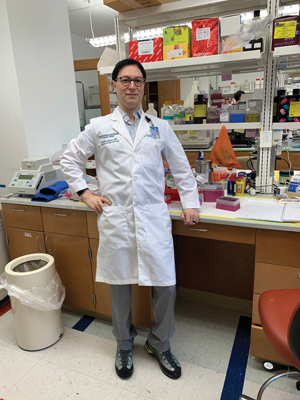
Dan Aires, CEO of Hylapharm
HylaPharm
One of the companies that got its start through the BTBC is HylaPharm, a university spinout developing cancer therapies with promising results in pet dogs. The strategy is to reverse tumor-induced immune suppression and decrease side effects of cancer treatments in human patients.
“Most cancer therapy is administered IV [intravenously]or orally, which means the entire body is exposed to potential side effects,” explains Daniel Aires, CEO of HylaPharm. “Direct injection gets the drug where it is needed and can be very effective while reducing or even avoiding the systemic side effects. In some cases, it can eliminate the need for systemic chemotherapy or surgery.”
He says the goal with immune therapies is to get the patient’s immune system to recognize the tumor as something that should not be there and destroy it. “Checkpoint inhibitors” are a recent advancement that stop the “checkpoint” (immune system cells that fight the tumor) from turning off the cells that kill the tumor. However, many patients don’t have activated immune cells to start with, so drugs for stopping the checkpoint are not effective. One drug created by HylaPharm works by causing the immune system to create the activated immune cells.
“There have been many important advances in treating cancer recently,” Aires says. “However, it remains a very challenging disease to treat. Many patients are not responding to current therapies. New ideas and new therapies are needed.”
With around five employees engaged in research, development and testing, HylaPharm is developing new therapeutics but has not yet progressed to the point of FDA approval, which means it has not yet begun clinical testing with human patients. But that is the goal.
“Reducing side effects and extending the life of cancer patients is important to both the patients and their families,” Aires says. “Our innovations have the potential to make cancer care better for large numbers of patients.”
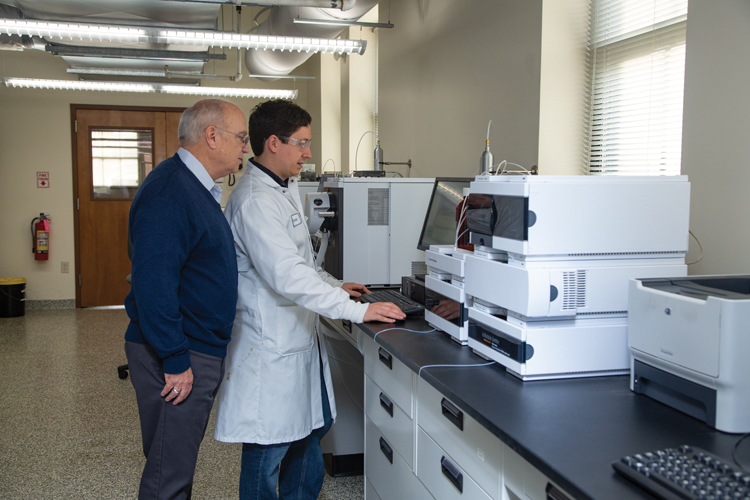
Dan Flynn, Ph.D., Chief Scientific Officer & Founder, with Chase Crawley, Scientist I, Chemistry (Reviewing data from a liquid chromatography–mass spectrometry.
Deciphera Pharmaceuticals
Another company focused on treating cancer and improving the lives of those living with cancer is Deciphera Pharmaceuticals. Based on a proprietary “Kinase Switch Control Inhibitor” platform, the company has developed a diverse pipeline of differentiated, wholly owned, orally administered drug candidates that include three clinical-stage and two research-stage programs. It focuses on three areas of cancer drug research that target: 1) tumor driver mutations (kinases that are mutated and drive tumor growth) 2) cancer immunotherapy and 3) cancer cell metabolism.
Daniel Flynn, founder, executive vice president and chief scientific officer, explains the largest protein family in the human genome that could be targeted to treat human disease, especially in cancer, is a protein family called “kinases.” Kinases are regulated in human cells by shape changes, controlled by embedded molecular switches that toggle the kinase between active and inactive shapes. In many cancers, these switches are deregulated, leading to uncontrolled kinase activation.
“We build these drugs to bind into broken switches in these cancer-containing kinases and develop these drugs to treat cancer patients in need of durable, transformative therapies. Our platform enables the discovery of drug candidates to treat a myriad of different cancers,” Flynn explains.
Deciphera’s staff of MDs, PhDs, biochemists, chemists, cell biologists and pharmaceutical scientists focuses on discovering new therapeutics. “Our switch control inhibitor platform uses Xray crystallography (structure-based drug design) and proprietary screening methods to identify and refine development candidates for progression into human cancer trials,” Flynn explains.
We are currently readying to manufacture and sell our first cancer drug, ripretinib, as early as next year, Flynn says. A new drug application will be submitted to the FDA in the first quarter of 2020.
Deciphera Pharmaceutical’s technology will “provide meaningful new treatments for cancer patients that provide best-in-class or first-in-class therapeutics to extend life and … quality of life” to those patients who currently have no approved therapy or are receiving therapy that is not durable or well-tolerated.
“The prize we keep our eye on is providing cancer drugs that make a difference in people’s lives, and that keeps us going,” he says.
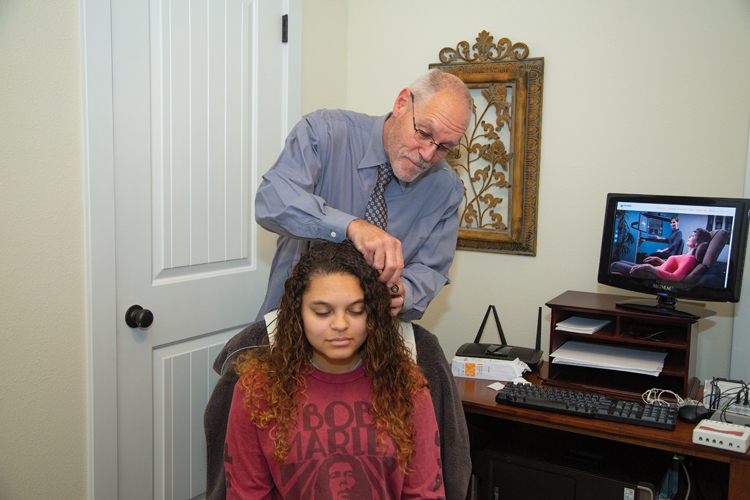

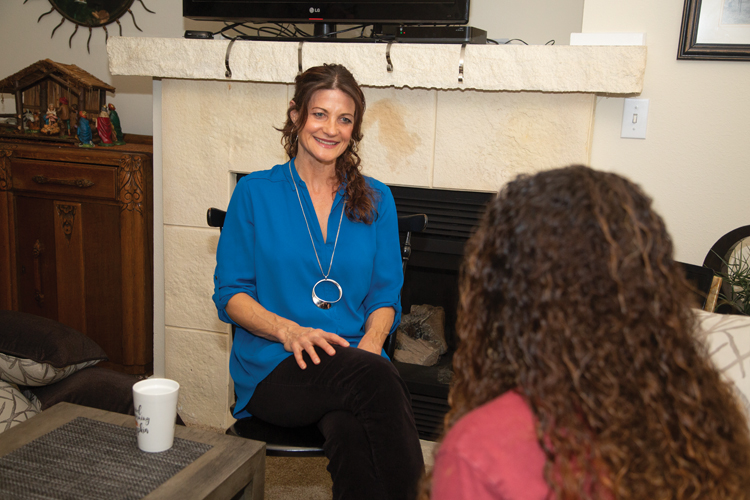 Top to bottom: Ed Bloch prepares client for a Cereset session; Bloch’s son Zach uses Cereset’s home device regularly to help keep his brain in balance and relaxed; Jena Bloch listens to her client during a counseling session at the Life Enrichment Center
Top to bottom: Ed Bloch prepares client for a Cereset session; Bloch’s son Zach uses Cereset’s home device regularly to help keep his brain in balance and relaxed; Jena Bloch listens to her client during a counseling session at the Life Enrichment Center
Cereset
A licensed therapist for 30 years, Ed Bloch had become frustrated with what he perceived as a lack of depth in the outcomes associated with psychotherapy. As he searched for a solution, he stumbled upon a company in Arizona that was working with an advanced neurotechnology that allowed the brain to recondition itself.
After several sessions, Bloch realized he’d found something uniquely different.
“The first thing I noticed … was that colors were more vibrant. Then … I realized I was sleeping better, waking with more energy … operating with greater ease,” he explains. “I had become more patient, more relaxed.”
It was at this point that Bloch knew what he had to do: take this technology back to Lawrence and blend it with the Life Enrichment Center (LEC) he and his wife, Jena, opened here in 2002. With the original intent of providing eating-disorder services to the area, the Center is now the counseling arm of the couple’s businesses, providing psychotherapy and counseling for many different mental health problems, including depression, anxiety, attention deficit disorder, trauma recovery and grief.
Once part of the LEC, Cereset’s BrainEcho technology, has continued to evolve and grow on its own as a franchise. The process involves using brain-initiated sound to relax the brain, allowing it to reset and rebalance itself, and freeing it of the “freeze” or “fight-or-flight” states. Initially doing 10 sessions with 10 to 15 follow-up sessions, the process has steadily become more client-friendly and now only requires five sessions and sometimes no follow-up sessions. There is also now a home device that enables the client to maintain the outcomes from the sessions in only minutes a day.
“Most of us have brains that have been traumatized, physically or psychologically, during our life, sometimes repeatedly,” Bloch explains. “Modern life alone can create significant imbalances in our brains and make life more difficult. Sometimes we don’t even know we are operating at less than peak efficiency. We think that our experience is optimal when, in fact, we are struggling.”
This process “serves as a mirror for the brain to recognize its imbalances,” he adds. Through the BrainEcho process, the brain “sees” those areas that need adjustment and goes to work resetting and rebalancing itself.
Clients seek out Cereset for many reasons: reactivity, poor motivation, poor energy, poor sleep, post-trauma struggles, mood instability, stress-related struggles, anxiousness, poor focus and concentration. A completely noninvasive process, clients can sleep during their hourlong sessions. “We do not targets symptoms, and we are not a medical device,” Bloch explains. “We simply allow the brain to relax, rebalance and reset itself.” The primary response clients achieve is greater sleep quality.
Tech-Forward
Through technology’s integration with areas like disease prevention, surgical procedures, better access to information and medical telecommunications, the health-care industry, as well as patients around the world, continue to benefit. Companies focused on innovating in the health-care industry for the common good must evolve and change with the times, and that’s exactly what many local, innovative companies are doing, making groundbreaking discoveries to benefit the industry and people as they exist today.
“Lawrence is a great place, an awesome community,” BTBC’s Underwood says. “There’s a ton of opportunity with the entrepreneurs in the community and those coming out of the university. We just need to harness all that potential.”
